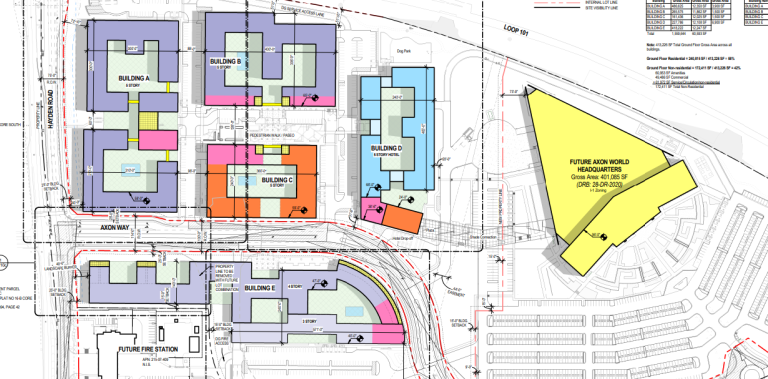By Roland Murphy for AZBEX
Senate Bill 1543, legislation that would halt a voter referendum in Scottsdale over Axon Enterprise, Inc.’s plan to build a mixed-use, master-planned corporate campus and headquarters near Mayo Blvd. and Hayden Road, now awaits a signature or veto from Gov. Katie Hobbs.
Both chambers of the Arizona Legislature approved the bill.
In an ongoing battle between the Governor and the Legislature, Hobbs office announced April 17, she would not sign any new legislation presented to her until Republicans in the Legislature approve a bipartisan funding bill that increases protections for disabled Arizonans.
The moratorium applies to bills that had not been transmitted to the Governor prior to the announcement. AZBEX was able to confirm SB1543 was transmitted April 16.
Having spent several months reporting on Axon’s plan and the efforts to halt the development by a contingent of community members opposed to apartments, as well as those members’ allies in a California union group and a local political agitator, we will not dive back into the background. Anyone interested in the issue’s history should please go here.
Hobbs must now weigh the potential legality of the measure to exempt the project against the significant economic impacts that will reverberate through the economy if Axon makes good on its promise to leave the state if the bill fails.
Development costs for the campus are estimated at $1.3B, and the 10-year economic impact is projected at $38B. Axon’s current market valuation is approximately $43B, making it one of the state’s most prosperous corporate residents.
Opponents have said the legislative move to allow the project to move forward, which allows apartments and other uses on light industrial-zoned land planned for corporate headquarters development in cities with populations of between 200,000 and 500,000, is unprecedented and unconstitutional, as the right to referendum is enshrined in the Arizona Constitution.
In comments this week, Hobbs indicated she may be leaning toward signing the bill, citing the importance of maintaining Axon’s presence in the state.
Phoenix Business Journal quoted Hobbs from an April 15 appearance in which she said, “I’m still looking at the final version that came out of the Senate, but what I will say is, they’re a company that’s here, they want to stay here, they are creating jobs. And not only that, but they are now helping to address the affordable housing crisis by using the state land that they bought to build housing to house their workforce.”
Axon said in a statement, “We offer sincere thanks to the bill’s sponsors, the legislators who supported this important measure, and the Arizona Chamber of Commerce and Greater Phoenix Leadership for their steadfast support and advocacy.”
Opponents have promised to take action in court to stop the legislation if Hobbs signs it. It is presumed they would seek an injunction to keep the law from taking effect and/or allowing Axon to start construction until the case is resolved.
Scottsdale City Councilmember Barry Graham, one of the most vocal opponents of the Axon project in the already generally anti-development body, posted on social media site NextDoor he had requested a meeting with Gov. Hobbs to discuss the legislation but his request was refused.
Arizona law gives the Governor five days, not including Sundays, to sign or veto a bill after it is passed. If she does not sign or veto the bill, it becomes law automatically.


